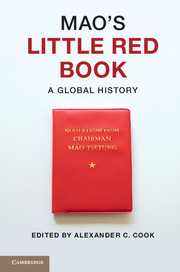Book contents
- Frontmatter
- Contents
- List of illustrations
- List of contributors
- Preface
- 1 Introduction
- 2 A single spark
- 3 Quotation songs
- 4 Mao quotations in factional battles and their afterlives
- 5 Translation and internationalism
- 6 Maoism in Tanzania
- 7 Empty symbol
- 8 The influence of Maoism in Peru
- 9 The book that bombed
- 10 Mao and the Albanians
- 11 Partisan legacies and anti-imperialist ambitions
- 12 Badge books and brand books
- 13 Principally contradiction
- 14 By the book
- 15 Conclusion
- Index
- References
11 - Partisan legacies and anti-imperialist ambitions
The Little Red Book in Italy and Yugoslavia
Published online by Cambridge University Press: 05 June 2014
- Frontmatter
- Contents
- List of illustrations
- List of contributors
- Preface
- 1 Introduction
- 2 A single spark
- 3 Quotation songs
- 4 Mao quotations in factional battles and their afterlives
- 5 Translation and internationalism
- 6 Maoism in Tanzania
- 7 Empty symbol
- 8 The influence of Maoism in Peru
- 9 The book that bombed
- 10 Mao and the Albanians
- 11 Partisan legacies and anti-imperialist ambitions
- 12 Badge books and brand books
- 13 Principally contradiction
- 14 By the book
- 15 Conclusion
- Index
- References
Summary
We should support whatever the enemy opposes and oppose whatever the enemy supports.
Classes and Class StruggleYou’ve got (Chinese) mail: Italy and Yugoslavia
In early 1971, a university student in Venice, Italy, wrote to the Chinese embassy in Rome expressing interest in receiving an Italian-language copy of the Little Red Book. At more or less the same time, a high-school student in Pakrac, Yugoslavia, wrote to the Chinese embassy in Belgrade expressing interest in receiving a Serbo-Croatian-language copy of the Little Red Book. Each Chinese embassy complied and sent free of charge “exotically packaged” bundles to their respective applicants containing a little red book with a gold star, a plastic covering, and Mao’s portrait inside. But with one difference: intent.
The university student in Venice was called into the Central Post Office to receive his mail from the Chinese embassy. And once he saw what awaited him, he was perplexed by the fact that the Chinese embassy had sent well over a hundred copies of the Little Red Book. With no way to carry such a quantity in a city with many bridges and no cars, the student corralled his friends to help him carry the books home. And once home, he opened a letter from the People’s Republic of China inviting him to distribute the books. The high-school student in Pakrac received no such surprises. Instead, he strolled along the busy provincial streets of his town in northern Yugoslavia to pick up, at the local post office, the single copy of the Little Red Book he had requested. To his delight, he also received a letter, but this one only expressed the guarded compliments of the People’s Republic of China.
- Type
- Chapter
- Information
- Mao's Little Red BookA Global History, pp. 185 - 205Publisher: Cambridge University PressPrint publication year: 2014

